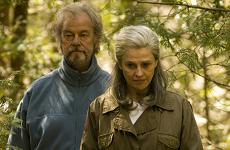Best of 2014: In Salute of Collaboration, Pt. 5

Liv LeMoyne, Mira Barkhammar, and Mira Grosin in the aptly titled We Are the Best!
After installments 1, 2, 3, and 4, we reach the final dozen partnerships I want to salute from the last year of ticket-buying and festival-hopping. Please note that I hadn't seen Selma when I plotted out this series, or else I would have recognized its sprawling and sterling supporting ensemble of activists—Stephan James, André Holland, Wendell Pierce, Tessa Thompson, Common, Lorraine Toussaint, Henry Sanders, Keith "Short Term" Stanfield, Niecy Nash, Oprah Winfrey, Colman Domingo, Ruben Santiago-Hudson, and more. They convey so much with few if any King-like moments to seize the spotlight, evoking several historically august personages without pulling focus or acting "important." And I still haven't screened Leviathan, A Most Violent Year, Cake, The Good Lie, Top Five, Inherent Vice, American Sniper, or several other commercial releases that seem like viable plays for this type of recognition... to say nothing of the many, many festival titles I've missed. But conceding all those necessary omissions, there's still so much to savor.
41. Tom Hiddleston and Tilda Swinton, Only Lovers Left Alive - Talk about directorial conceptions that would be hard to penetrate: Only Lovers is a mordant hipster globe-hopping comic romantic political vampire story about devotion over time, the dying world, the gutting of Detroit, dysfunctional relatives, and rad taste in guitars. It's funny, spooky, taciturn, and strange. As much as Tilda Swinton seems like an osmotic chameleon—capable of turning into anything she touches, the weirder the better—I refuse to believe it doesn't take work. Even though Tom Hiddleston joined the movie late, when Michael Fassbender had to bail, he seems like he's always been there: not just throughout pre-production, but for the last 2,000 years. One imagines that pretending to be in love with Swinton or Hiddleston would be easy, but wittily conveying several centuries of familiarity and un-gloopy admiration is surely a special skill. I was in the seeming minority in being spellbound by Jarmusch's Limits of Control a few years ago, which also featured Swinton and John Hurt, but that was unmistakably one man's weird vision; actors offered themselves as manipulable pawns. Only Lovers Left Alive is just as idiosyncratic, yet it feels co-authored by everyone in it, but especially by its leads, like a funky hallucination they had together. Pull up a popsicle and enter the dream.
42. The Miners and the Queers, Pride - Matthew Warchus directed one of the year's largest ensembles; there must be two-dozen actors with speaking parts and legible arcs in Pride. The clear mapping of everyone's journeys, both common and private, plays like an unpretentious miracle. More than most films in this feature, Collaboration is the explicit theme of Pride, and its ethos of empathetic mobilization is impossible to refuse. It's hard enough these days to drum up people's energies in solidarity of their own tribes, as evidenced by how little business Pride did compared to what it deserved. WTF, gays?? But it's even harder to mobilize people on behalf of folks who don't remind them of themselves, particularly across the urban-rural gulf. Even free-thinkers and anti-patriarchs like Xavier Dolan (Tom at the Farm) and Josephine Decker (Thou Wast Mild and Lovely) seem openly terrified of crossing that particular divide. So at risk of just effusing over this movie's blatant message and with all due respect to how expertly it pulls off its projects, the common cause hammered out within the story between the Welsh laborers and the lavender Londoners was one of the most transformative spectacles in a year of cinema. Extra points for the film's repeated attention, witty but pointed, to the vestiges of sexism among even the most emancipated or outwardly effeminate of men.
43. Ossama Mohammed and Wiam Simav Bedirxan, Silvered Water, Syria Self-Portrait - Have you ever painted a self-portrait? Have you ever done it with your paintbrush on one continent and your canvas on another? And also while the canvas is on fire? That's more or less what Mohammed and Bedirxan accomplish in the year's most bracing movie, and arguably its most urgent. He's a renowned film artist who has expatriated to France to escape the burgeoning Holocaust at home, and also to safeguard and disseminate footage of that violence that has already been entrusted to him. She, a Kurdish activist more recently settled in Syria, is now a stalwart holdout. Intent on documenting the ravages and tending to the mostly-abandoned children of Homs, she is eager for an expert's advice about what to shoot and how to export the footage. These two never met until "their" film premiered at Cannes. What is indescribably horrifying to watch is also indescribably ennobling to behold: two swimmers caught in strong, bloody currents, clinging to each other across time zones, surviving the cataclysm, inciting us to action and inspiring us to realize our own potentials as witnesses and testifiers.
Read more »
Labels: Best of 2014, Collaborations 2014, Experimental, International, Jim Jarmusch, Jonathan Glazer, Laura Dern, LGBT, Marion, Middle Eastern Cinema, Music, Reese Witherspoon, Scandinavia, Tilda Swinton, UK
 Nick's Flick Picks: The Blog
Nick's Flick Picks: The Blog




 You loved them in
You loved them in 
 Roy Andersson,
Roy Andersson,  Amy Adams,
Amy Adams,  Peter Capaldi,
Peter Capaldi, 


 Anna Chlumsky,
Anna Chlumsky,  Jason Clarke,
Jason Clarke, 

 So, let's pretend that October had been less frenetic and that I actually did inform you of these two thrilling events in a more timely fashion—since, as it happens, I'm already in London, where I'm spending my two-week trip with the heroic and debonair Tim R. of
So, let's pretend that October had been less frenetic and that I actually did inform you of these two thrilling events in a more timely fashion—since, as it happens, I'm already in London, where I'm spending my two-week trip with the heroic and debonair Tim R. of  My first London screening was less auspicious, I'm sad to report, though a subprime
My first London screening was less auspicious, I'm sad to report, though a subprime  I went completely crazy when
I went completely crazy when  I can't believe I'm away from home and from e-mail when all the critics' awards are pouring in. Y'all do not need me to summarize who won what in New York, Los Angeles, and Boston, or what the National Board of Review had to say;
I can't believe I'm away from home and from e-mail when all the critics' awards are pouring in. Y'all do not need me to summarize who won what in New York, Los Angeles, and Boston, or what the National Board of Review had to say;  2. Speaking of Casey Affleck, he's an even less ambiguous lead in
2. Speaking of Casey Affleck, he's an even less ambiguous lead in  4.
4.  6.
6. 
 Tilda Swinton stars as a hotshot lawyer named Eve. Right off the bat, you can tell that subtlety isn't the movie's elected forte, and yet, why and how Swinton's character is an "Eve" is hard to pin down. A rising star on the legal circuit with a prestigious judgeship all but guaranteed to come her way, she embodies a mix of professional competence and self-alienation that isn't exactly unfamiliar—don't all professional women in American movies eventually realize that they don't know who they are?—and yet, because she's played by Swinton, Eve's unraveling doesn't feel conventional. Instead, it's a strangely out-of-body experience, navigated by the only Brechtian actress working in modern film, whose masklike and yet disarmingly lucid face always works in ironic tandem with her stiffly elegant body. Surrounding Swinton are a clutch of other women who were case studies and paragons in Dr. Louise J. Kaplan's original book (full title: Female Perversions: The Temptations of Emma Bovary), and whom the screenplay by director Streitfeld and co-writer Julie Hébert determinedly maroon somewhere between being characters and ciphers. Amy Madigan, a coiled and arrestingly spiteful actress, has her finest hour here as Madeleine, the black-sheep sister of Swinton's powerful up-and-comer. Madigan shoplifts a silk scarf with a memorable glower, she all but deliberately sabotages her sister's professional coronation, and she manages the neat trick of constantly messing everything up for everyone in the movie (including for herself) without sacrificing the audience's interest. Frances Fisher blowzes around as a good-time girl, Laila Robins is tearful as a dressmaker in a trailer, Paulina Porizkova strides through her scenes as an immaculately tailored rival of Swinton's, and Karen Sillas—an underrated and little-remembered presence from Tom Noonan's What Happened Was... and some Hal Hartley films—stands toe-to-toe with Swinton as one of two lovers whom the bisexual Eve keeps stringing along. Marcia Cross puts in a mysterious cameo, basically the same shot repeated several times, as Swinton and Madigan's abused mother, and an unknown, almost androgynous waif named Dale Shuger slides even more slivers of unease beneath your skin as Edwina, a teenaged girl who flees from all the parodic female visions around her, retreating into an intensely private life of scarring her flesh and burying the pads and tissues stained with her ovulated blood.
Tilda Swinton stars as a hotshot lawyer named Eve. Right off the bat, you can tell that subtlety isn't the movie's elected forte, and yet, why and how Swinton's character is an "Eve" is hard to pin down. A rising star on the legal circuit with a prestigious judgeship all but guaranteed to come her way, she embodies a mix of professional competence and self-alienation that isn't exactly unfamiliar—don't all professional women in American movies eventually realize that they don't know who they are?—and yet, because she's played by Swinton, Eve's unraveling doesn't feel conventional. Instead, it's a strangely out-of-body experience, navigated by the only Brechtian actress working in modern film, whose masklike and yet disarmingly lucid face always works in ironic tandem with her stiffly elegant body. Surrounding Swinton are a clutch of other women who were case studies and paragons in Dr. Louise J. Kaplan's original book (full title: Female Perversions: The Temptations of Emma Bovary), and whom the screenplay by director Streitfeld and co-writer Julie Hébert determinedly maroon somewhere between being characters and ciphers. Amy Madigan, a coiled and arrestingly spiteful actress, has her finest hour here as Madeleine, the black-sheep sister of Swinton's powerful up-and-comer. Madigan shoplifts a silk scarf with a memorable glower, she all but deliberately sabotages her sister's professional coronation, and she manages the neat trick of constantly messing everything up for everyone in the movie (including for herself) without sacrificing the audience's interest. Frances Fisher blowzes around as a good-time girl, Laila Robins is tearful as a dressmaker in a trailer, Paulina Porizkova strides through her scenes as an immaculately tailored rival of Swinton's, and Karen Sillas—an underrated and little-remembered presence from Tom Noonan's What Happened Was... and some Hal Hartley films—stands toe-to-toe with Swinton as one of two lovers whom the bisexual Eve keeps stringing along. Marcia Cross puts in a mysterious cameo, basically the same shot repeated several times, as Swinton and Madigan's abused mother, and an unknown, almost androgynous waif named Dale Shuger slides even more slivers of unease beneath your skin as Edwina, a teenaged girl who flees from all the parodic female visions around her, retreating into an intensely private life of scarring her flesh and burying the pads and tissues stained with her ovulated blood. I recently signed off as a
I recently signed off as a  I, though, was secretly much more taken with Orlando, a movie I had virtually made up my mind to love anyway. Another anecdote: the first issue of Entertainment Weekly I ever bought and obsessed over was the Summer Movie Preview in 1993, warmly remembered for the moment at which I finished reading about Cliffhanger and Jurassic Park and Sleepless in Seattle and suddenly flipped to a picture of a red-headed androgyne and a withered old man cast as Queen Elizabeth, both of them bedecked in the most outlandishly plush theatrical finery while escorting a pack of grey, almost aqueline hunting dogs down the proverbial garden path. Aside from its sheer beauty, I couldn't believe that this picture was afforded a full half-page, or that the plot explored a literal, magical switching of a person's gender, or that it was written by this "Virginia Woolf" about whom I was just learning. (Albee's pun escaped me entirely; frankly, it kind of still does.) It was hard for me to imagine that Orlando could possibly measure up to the promise of this photostill, so imagine my awe when that shot came and went a mere 10 or 15 minutes into the film. Imagine my elation at actually loving the film, rather than just posing as one who loved it. The minute I reached the end of The Vampire Lestat, which I was then reading, I lept into Woolf's novel, was stunned by how different it was in tone as well as incident, but I loved it just as much, and couldn't stop gazing at Tilda Swinton's arch but somehow sly, Holbein-type portrait on the cover of the Harcourt Brace reprint. We could sum all of this up as a sort of
I, though, was secretly much more taken with Orlando, a movie I had virtually made up my mind to love anyway. Another anecdote: the first issue of Entertainment Weekly I ever bought and obsessed over was the Summer Movie Preview in 1993, warmly remembered for the moment at which I finished reading about Cliffhanger and Jurassic Park and Sleepless in Seattle and suddenly flipped to a picture of a red-headed androgyne and a withered old man cast as Queen Elizabeth, both of them bedecked in the most outlandishly plush theatrical finery while escorting a pack of grey, almost aqueline hunting dogs down the proverbial garden path. Aside from its sheer beauty, I couldn't believe that this picture was afforded a full half-page, or that the plot explored a literal, magical switching of a person's gender, or that it was written by this "Virginia Woolf" about whom I was just learning. (Albee's pun escaped me entirely; frankly, it kind of still does.) It was hard for me to imagine that Orlando could possibly measure up to the promise of this photostill, so imagine my awe when that shot came and went a mere 10 or 15 minutes into the film. Imagine my elation at actually loving the film, rather than just posing as one who loved it. The minute I reached the end of The Vampire Lestat, which I was then reading, I lept into Woolf's novel, was stunned by how different it was in tone as well as incident, but I loved it just as much, and couldn't stop gazing at Tilda Swinton's arch but somehow sly, Holbein-type portrait on the cover of the Harcourt Brace reprint. We could sum all of this up as a sort of 













